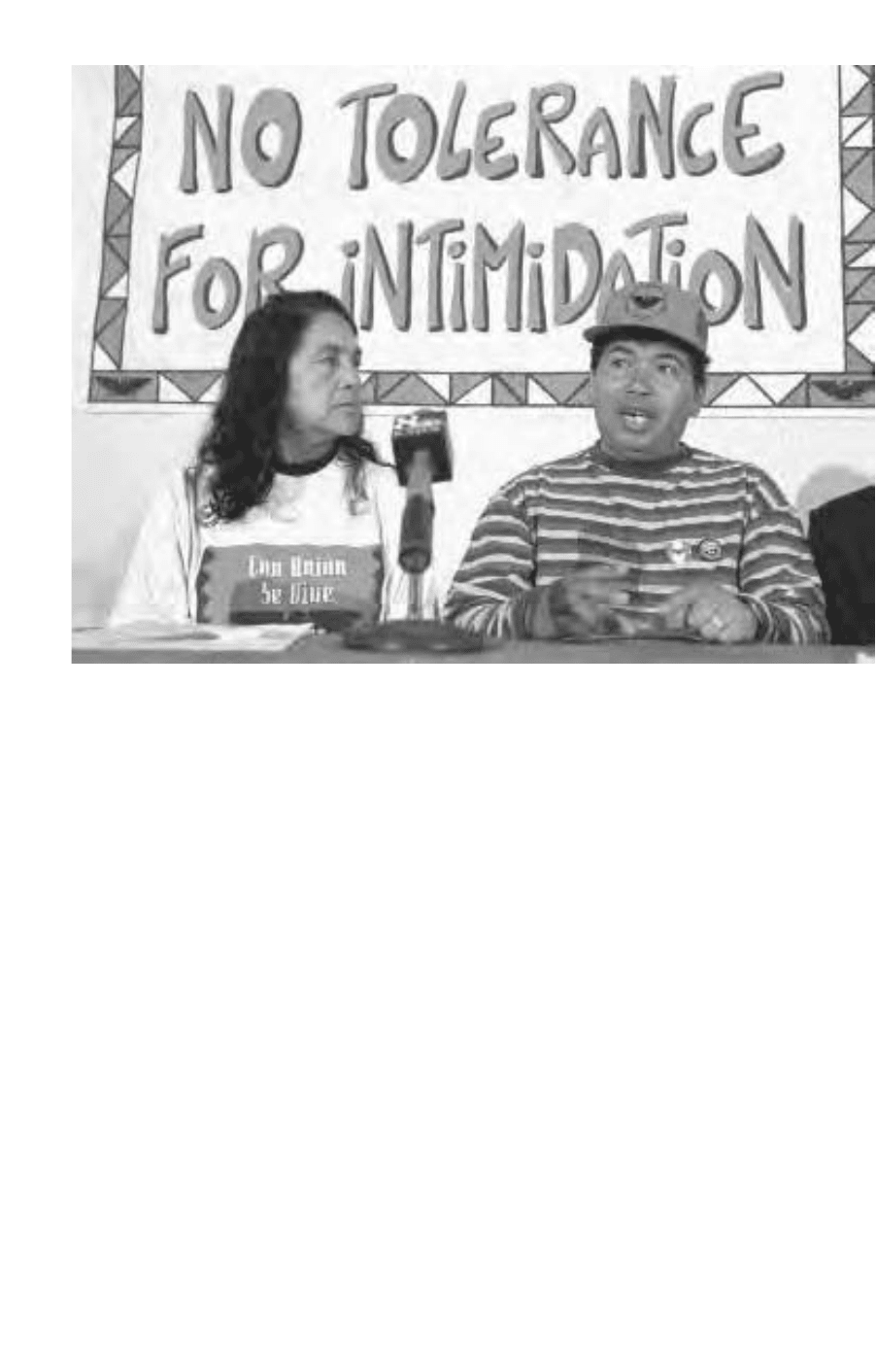Schenken Suzanne O’Dea. From Suffrage to the Senate: An Encyclopedia of American Women in Politics (2 Volumes)
Подождите немного. Документ загружается.


court dismissed her lawsuit on the ground that Title VII did not apply to
the selection of partners in a partnership. The U.S. Supreme Court dis-
agreed with the district court and said that Title VII covers partners in a
partnership and bans discrimination on the basis of race or sex.
See also Civil Rights Act of 1964, Title VII; Employment Discrimination
References Hishon v. King and Spalding, 467 U.S. 69 (1984).
Hobby, Oveta Culp (1905–1995)
The first secretary of the U.S. Department of Health, Education, and Wel-
fare, Democrat Oveta Culp Hobby was also the first director of the
Women’s Auxiliary Army Corps. Hobby began her public service career as
a dollar-a-year executive with the War Department in the women’s inter-
est section of the Bureau of Public Relations. The next year, she developed
plans for the newly created Women’s Auxiliary Army Corps and became
the first director of the corps in 1942, holding the rank of colonel. The
corps ended its auxiliary status in 1943 and became the Women’s Army
Corps (WAC) with full military status. Many of Hobby’s initial duties in-
volved establishing policies and procedures for military women, recruiting
them, and integrating them into the armed forces. She dealt with both
substantive and trivial issues. African Americans questioned how a south-
erner such as Hobby would deal with training and appointing officers,
prompting Hobby’s announcement that African American women would
be appointed officers in proportion to the number of African American
women in the general population. She appeared before Congress’s Military
Affairs Committee to gain approval for the positions women could hold in
the army and obtained its consent on 239 job classifications. Throughout
her tenure as head of the corps, Hobby fought sex biases. For example, the
military proposed dishonorable discharge for women who became preg-
nant without prior approval, but Hobby objected by proposing that men
who fathered children out of wedlock should also receive a dishonorable
discharge. Hobby won her point, and pregnant WACs received honorable
discharges. The press questioned her on whether or not women would be
able to wear makeup. Hobby concluded that they could wear modest
amounts of it. At the end of World War II, about 100,000 women had
served in the corps. In 1945, Hobby resigned and returned to Houston.
Although Hobby considered herself a conservative Democrat, she
supported Republican governor Thomas E. Dewey’s unsuccessful 1948
presidential campaign. As coeditor and publisher of the Houston Post, she
announced her support for Republican General Dwight D. Eisenhower’s
1952 presidential candidacy and spent several months in New York work-
ing in the Citizens for Eisenhower headquarters. After winning the election,
Hobby, Oveta Culp 335

Eisenhower appointed Hobby to head the Federal Security Agency, which
became the Department of Health, Education, and Welfare (HEW). As
secretary of HEW, Hobby supervised the development of nurse-training
programs and a hospital reinsurance program. Her most important con-
tribution was likely her decision to license six drug companies to manu-
facture the Salk vaccine for polio in 1955.
Born in Killeen, Texas, Hobby studied law at Mary Hardin–Baylor
College and completed her studies at the University of Texas Law School.
In 1919, when she was in high school, Hobby’s father was elected to the
Texas legislature, and she went with him to Austin to work for him. In
1925, she became parliamentarian of the Texas legislature, holding the po-
sition for six years, and served in the position again in 1939 and 1941. She
wrote Mr. Chairman, a textbook on parliamentary procedure, in 1937.
Married to former Texas governor and newspaper owner William
Pettis Hobby, Oveta Hobby was an editor and executive vice president of
the newspaper as well as executive director of a radio station her husband
owned. Following her retirement from government service, Hobby re-
turned to Houston and resumed her role in the newspaper and the fam-
ily’s other business enterprises.
See also Cabinets, Women in Presidential; Military, Women in the; Rogers,
Edith Frances Nourse
References Crawford and Ragsdale, Women in Texas (1992); H. W. Wilson,
Current Biography: Who’s News and Why, 1942 (1942), Current Biography:
Who’s News and Why, 1953 (1953); New York Times, 17 August 1995;
Schoenebaum, ed., Political Profiles: The Eisenhower Years (1977).
Hodgson v. Minnesota (1990)
Hodgson v. Minnesota challenged a 1981 Minnesota law requiring that the
parents of a female child under eighteen years of age be notified before she
could obtain an abortion. Under the law, both parents of the minor female
seeking an abortion had to be given notice forty-eight hours before the
procedure could be performed. The law included a judicial bypass proce-
dure, which meant that if the young woman did not wish to notify her
parents, she could go to a judge for notification. To obtain a court order,
the minor female had to prove that she was mature and capable of giving
informed consent. The law also specified exceptions to the two-parent no-
tification, including divorce; emergency treatment to save the woman’s
life; and sexual or physical abuse, in which case the proper authorities had
to have been notified.
Abortion clinics, physicians, pregnant minors, and others filed suit,
claiming the law violated the due process and equal protection clauses of
the Fourteenth Amendment. The Court invalidated the two-parent noti-
336 Hodgson v. Minnesota

fication without a judicial bypass procedure, saying that it had no rational
basis. The Court upheld the forty-eight-hour waiting period and the two-
parent notification that included a procedure for a judicial waiver.
See also Abortion; Fourteenth Amendment
References Hodgson v. Minnesota, 497 U.S. 417 (1990).
Holt, Marjorie Sewell (b. 1920)
Republican Marjorie Holt of Maryland served in the U.S. House of Rep-
resentatives from 3 January 1973 to 3 January 1987. Holt entered Congress
with an agenda of reducing nonmilitary spending and increasing military
spending, and in 1978 she introduced an alternative budget and came
within five votes of passing it. Holt continued to regularly develop and in-
troduce her Republican version of the budget, which became part of her
party’s national political strategy. She adamantly opposed school busing,
introduced measures to end it, and gained House approval for a constitu-
tional amendment to ban it.
Born in Birmingham, Alabama, Marjorie Holt earned her bachelor’s
degree from Jacksonville University in 1945 and her law degree from the
University of Florida in 1949. After several years in private law practice,
Holt was circuit court clerk for Anne Arundel County Court from 1966 to
1972. She served on the Maryland Governor’s Commission on Law En-
forcement and Administration of Justice from 1970 to 1972.
See also Congress, Women in
References Congressional Quarterly, Politics in America: Members of Congress
in Washington and at Home (1983); Office of the Historian, U.S. House of
Representatives, Women in Congress, 1917–1990 (1991).
Holtzman, Elizabeth (b. 1941)
Democrat Elizabeth Holtzman of New York served in the U.S. House of
Representatives from 3 January 1973 to 3 January 1981. When Holtzman
entered the 1972 Democratic primary, she challenged incumbent congress-
man Emanuel Celler, who had represented the district for fifty years. Celler,
whose campaign was well financed and whose campaign organization was
far more sophisticated than Holtzman’s, dismissed her candidacy. She con-
ducted a grassroots campaign, emphasized her opposition to the war in
Vietnam, argued that Celler had become removed from his constituency,
and pointed to the amount of time he was absent from Congress. Her vic-
tory in the primary election all but ensured her election to Congress.
Shortly after Holtzman entered Congress, President Richard Nixon
ordered the bombing of Cambodia, and she filed suit in U.S. district court
to stop the bombings. The court ordered them to stop, but the decision
Holtzman, Elizabeth 337

was overturned on appeal. She took the matter to the U.S. Supreme Court,
but her request for a hearing was denied.
In 1979, Holtzman discovered that fifty alleged Nazi war criminals
resided in the United States, and she began a crusade to have them de-
ported. For years, she challenged the Immigration and Naturalization Ser-
vice to respond to her demands for deportation action, and eventually
more than 100 Nazi war criminals were expelled from the United States.
A feminist, Holtzman was one of the organizers and one of the first
cochairs of the Congresswomen’s Caucus, later known as the Congres-
sional Caucus for Women’s Issues, created to bring women members of
Congress together to discuss matters of common interest. Holtzman
served on the President’s National Commission on the Observance of In-
ternational Women’s Year, the group that planned the 1977 National
Women’s Conference. A strong Equal Rights Amendment supporter,
Holtzman told one group: “Sooner or later, inevitably and inexorably, our
Constitution will embody the principle of women’s equality under the
law.” In 1978, she passed a bill that helped protect the privacy of rape vic-
tims by preventing cross-examination into their prior sexual experience.
Holtzman entered the 1980 Democratic primary for the U.S. Senate
instead of running for a fifth term. She won the primary but lost the gen-
eral election. In 1981, Holtzman won the race for district attorney of
Brooklyn, where she served until 1989, the year she was elected comptrol-
ler of New York City. After serving from 1990 to 1994, she returned to pri-
vate law practice.
Born in New York, New York, Holtzman received her bachelor’s de-
gree from Radcliffe College in 1962 and her law degree from Harvard Law
School in 1965. While in law school, she spent the summer of 1963 in
Georgia working with the Student Nonviolent Coordinating Committee,
a civil rights organization. The next summer she worked for the National
Association for the Advancement of Colored People Legal Defense and
Education Fund.
See also Congress, Women in; Congressional Caucus for Women’s Issues; Equal
Rights Amendment; Heckler, Margaret Mary O’Shaughnessy; National
Women’s Conference
References Holtzman, Who Said It Would Be Easy: One Woman’s Life in the Po-
litical Arena (1996); Office of the Historian, U.S. House of Representatives,
Women in Congress, 1917–1990 (1991).
Honeyman, Nan Wood (1881–1970)
Democrat Nan Honeyman of Oregon served in the U.S. House of Repre-
sentatives from 3 January 1937 to 3 January 1939. Honeyman strongly
supported New Deal policies and was accused of subordinating her dis-
338 Honeyman, Nan Wood

trict’s needs to President Franklin D. Roosevelt’s national political con-
cerns. She was defeated in her attempt for a second term in 1938 and in
1940. She was senior representative for the Pacific Coast of the Office of
Price Administration in 1941 and 1942 and collector of customs for Port-
land, Oregon, from 1942 to 1953.
Born in West Point, New York, Nan Honeyman graduated from St.
Helens Hall in 1898 and later attended Finch School in New York to study
music. Honeyman served in the Oregon House of Representatives from
1935 to 1937 and filled a vacancy in the Oregon Senate in 1942.
See also Congress, Women in; State Legislatures, Women in
References Office of the Historian, U.S. House of Representatives, Women in
Congress, 1917–1990 (1991).
hooks, bell (b. 1952)
African American intellectual bell hooks has criticized the feminist move-
ment for its racism and has argued that it must recognize that women
have a variety of backgrounds and experiences and that race and class af-
fect women’s lives as much as gender. She seeks to understand race, gen-
der, and class biases by beginning with her own experiences and the expe-
riences of other women and developing theories from them. She further
seeks to use her theories to alter the ways people live their lives, which she
calls the practical phase of her work. To involve a larger audience than ac-
ademics, hooks uses popular culture to link familiar movies or books to
theory, providing a base from which to engage students and readers and
then move them to considering theory.
College professor and mentor, hooks has published several works, in-
cluding Ain’t I a Woman: Black Women and Feminism (1981); Feminist
Theory from Margin to Center (1984); Yearning: Race, Gender, and Cultural
Politics (1990); Breaking Bread: Insurgent Black Intellectual Life (1991); and
Teaching to Transgress: Education as the Practice of Freedom (1994).
Born in Hopkinsville, Kentucky, bell hooks was given the name Glo-
ria Jean Watkins, taking her maternal great-grandmother’s name when
she began her writing career. She uses lowercase letters instead of capital
letters because she believes that who has written something is less impor-
tant than what they have written. hooks completed her undergraduate
studies at Stanford University in 1973 and earned her master’s degree
from the University of Wisconsin in 1976 and her doctoral degree from
the University of California at Santa Cruz in 1983. She has taught at vari-
ous California universities, Yale University, Oberlin College, and the City
College of New York.
See also Feminist Movement
hooks, bell 339

References H. W. Wilson, Current Biography Yearbook, 1995 (1995); hooks, with
Mckinnon, “Sisterhood: Beyond Public and Private” (1996).
Hooley, Darlene (b. 1939)
Democrat Darlene Hooley of Oregon entered the U.S. House of Repre-
sentatives on 3 January 1997. During her congressional campaign, Hooley
pledged to work for income tax deductions for college tuition and for im-
proved vocational programs for people needing professional retraining.
Hooley’s congressional priorities include protecting funding for early
childhood education, preserving Social Security and Medicare, and pro-
tecting abortion rights.
Hooley became an activist for safer playgrounds in the 1970s,
served on the park district board, and then served on the West Linn City
Council from 1977 to 1981. While in the Oregon State House of Repre-
sentatives from 1981 to 1987, she passed welfare reform legislation that
moved people from welfare to work. She authored the state’s first recy-
cling laws, rewrote the state’s land use laws, and wrote and passed equal
pay laws.
Hooley accepted an appointment to fill a vacancy on the Clackamas
County Commission in 1987 and then won reelection to it until 1996. On
the commission, she worked to improve county roads, implement welfare
reform, increase the number of police, and create new jobs in the private
sector. She helped establish a pilot project in which welfare recipients re-
ceived counseling to reduce the number of people on welfare assistance.
Born in Williston, North Dakota, Darlene Hooley attended Pasadena
Nazarene College from 1957 to 1959 and received her bachelor’s degree
from Oregon State University in 1961.
See also Congress, Women in
References Congressional Quarterly, Politics in America 1998 (1997);
www.house.gov/hooley.
Horn, Joan Kelly (b. 1936)
Democrat Joan Horn of Missouri served in the U.S. House of Representa-
tives from 3 January 1991 to 5 January 1993. Horn was active in the
Democratic Party, the Missouri Women’s Political Caucus, and the Free-
dom of Choice Council, connections that provided her with an important
network when she sought a seat in Congress, her first political office. In
addition, she and her husband were partners in a research and polling
firm, which gave her additional political experience. She lost reelection at-
tempts in 1992 and 1996.
Born in St. Louis, Missouri, Joan Horn earned her bachelor’s degree
340 Hooley, Darlene

in 1973 and her master’s degree in 1975 from the University of Missouri
at St. Louis.
See also Congress, Women in
References Congressional Quarterly, Politics in America 1992 (1991).
Howe, Julia Ward (1819–1910)
Best known for writing “Battle Hymn of the Republic,” Julia Ward Howe
provided leadership in the areas of woman suffrage, women’s education,
and peace. Married in 1843 to social reformer Dr. Samuel Gridley Howe,
she bore six children in the next sixteen years. In addition to caring for
them, she attended lectures; studied foreign languages, religion, and phi-
losophy; and wrote poetry and dramas, interests she developed because
her husband did not want her involved in public life.
Julia Howe’s entrance into public life began when she anonymously
published Passion-Flowers, a collection of poems in 1854, and a second
collection, Words for the Hour, in 1857. She wrote “The Battle Hymn of the
Republic” in 1861, Atlantic Monthly published it in 1862, and it became a
Civil War anthem. With its success, Julia Howe actively engaged in her lit-
erary career, publishing a literary magazine in 1867.
She also became active in the woman suffrage movement. In 1868, she
was a founder and the first president of the New England Woman Suffrage
Association, serving until 1877 and again from 1893 to 1910. She became
a leader in the newly organized American Woman Suffrage Association in
1869. President of the Massachusetts Woman Suffrage Association from
1870 to 1877 and from 1891 to 1893, she founded a weekly woman suffrage
magazine, Woman’s Journal, in 1870, and edited it for twenty years.
Also in 1870, she wrote “Appeal to Womanhood throughout the
World,” a call to women to become active in peace issues. She organized
the Woman’s Peace Conference in London in 1872.
Howe’s husband died in 1876 and with her new freedom, she went
on her first speaking tour that year, advocating the development of a na-
tional women’s club movement. A founder of the New England Women’s
Club in 1868, she was its president for most of the rest of her life, begin-
ning in 1870. She was also a founder of the General Federation of
Women’s Clubs in 1890.
In addition to her commitments to woman suffrage and the women’s
club movement, Howe continued her literary career, publishing collec-
tions of her lectures, a biography of Margaret Fuller, and her memoirs.
See also American Woman Suffrage Association; General Federation of
Women’s Clubs; Peace Movement; Suffrage
References Garraty and Carnes, eds., American National Biography (1999).
Howe, Julia Ward 341

Hoyt v. Florida (1961)
The U.S. Supreme Court decided in Hoyt v. Florida that being judged by an
all-male jury did not violate an accused person’s Fourteenth Amendment
rights. At the time, women could not serve on state juries in three states,
and in twenty-six states and the District of Columbia women could claim
exemptions not available to men. In Florida, women who wanted to serve
on a jury had to register with the clerk of the circuit court, which few did.
In Hoyt, a woman convicted of killing her husband appealed on the
grounds that she had been denied her Fourteenth Amendment rights be-
cause Florida’s law unconstitutionally excluded women from jury service.
The woman argued that her case demanded women on the jury because
women would have been more sympathetic than men in considering her
temporary insanity defense.
The Court rejected her appeal, saying first that “woman is still re-
garded as the center of home and family life. We cannot say that it is con-
stitutionally impermissible for a State, acting in pursuit of the general wel-
fare, to conclude that a woman should be relieved from the civic duty of
jury service unless she herself determines that such service is consistent
with her own special responsibilities.” From that perspective, the Court
said that it was reasonable “for a state legislature to [assume] that it would
not be administratively feasible to decide in each individual instance
whether family responsibilities of a prospective female juror were serious
enough to warrant an exemption.”
In 1975, the Court overturned this decision in Taylor v. Louisiana.
See also Fourteenth Amendment; Juries, Women on; Taylor v. Louisiana
References Getman, “The Emerging Constitutional Principle of Sexual Equal-
ity” (1973); Hoyt v. Florida, 368 U.S. 57 (1961).
Huck, Winifred Sprague Mason (1882–1936)
Republican Winifred Huck of Illinois served in the U.S. House of Repre-
sentatives from 7 November 1922 to 3 March 1923. The daughter of Con-
gressman William Mason, who died in office, Winifred Huck won the spe-
cial election to fill the vacancy. She introduced legislation to grant
independence to the Philippine Islands, to grant self-government to Cuba
and Ireland, and to require a direct popular vote before U.S. armed forces
could be involved in an overseas war. She was denied the party’s nomina-
tion for the full term that began in 1923.
In 1925, Huck investigated the criminal justice system and prisons.
With the cooperation of Ohio’s governor, she was arrested for a minor
crime, convicted, incarcerated for a month, and pardoned by the gover-
nor. She then began a trip to New York, seeking employment as an ex-
342 Hoyt v. Florida

convict along the way and writing a series of syndicated articles about her
experiences. In 1928 and 1929, she was an investigative reporter for
Chicago Evening Post.
Huck was born in Chicago, Illinois.
See also Congress, Women in
References James, ed., Notable American Women 1607–1950 (1971); New York
Times, 26 August 1936.
Huerta, Dolores (b. 1930)
Dolores Huerta has sought economic and employment justice for His-
panic American agricultural workers since the early 1960s, when she and
Cesar Chavez cofounded the National Farm Workers Association
(NFWA). A folk hero in the Mexican American community for her work
as a contract negotiator, strike organizer, lobbyist, and boycott coordina-
tor, Huerta has been arrested more than two dozen times and has experi-
enced harassment and violence.
Huerta entered the migrant labor movement in part out of frustra-
tion at teaching migrants’ children because, she later explained:“I couldn’t
stand seeing kids come to class hungry and needing shoes. I thought I
could do more by organizing farm workers than by trying to teach their
hungry kids.” In 1955, she met a representative of the Community Service
Organization (CSO), a Mexican American self-help association that
sought to empower Latinos through political action. A founding member
of the Stockton, California, CSO, Huerta served as the group’s lobbyist to
the California legislature in the late 1950s and early 1960s. She helped pass
more than a dozen bills, including measures requiring businesses to pro-
vide pensions to legal immigrants and allowing farmworkers to receive
public assistance, retirement benefits, and disability and unemployment
insurance regardless of their status as U.S. citizens.
Through CSO, Huerta worked with Chavez, who proposed creating a
union for farmworkers. In 1962, they formed the NFWA, went into fields,
and explained the anticipated benefits of organizing to farmworkers.
Chavez and Huerta endured threats from landowners and law enforcement
officers. When the American Federation of Labor–Congress of Industrial
Organizations (AFL-CIO) initiated a strike against California grape grow-
ers, the NFWA joined the effort in 1965. The AFL-CIO group and the
NFWA merged into the United Farm Workers Organizing Committee
(UFWOC) in 1966. For her involvement in the strike as an organizer,
Huerta was repeatedly arrested and placed under surveillance by the Cen-
tral Intelligence Agency.
Huerta was named chief negotiator for UFWOC, even though she was
Huerta, Dolores 343

not a lawyer, had no experience as a labor negotiator, and had never read a
union contract before the strike began. By 1967 she had negotiated con-
tracts that gave workers an hourly raise, health care benefits, job security,
and protection from pesticide poisoning. Despite the success with some
growers, the majority resisted the UFWOC, and the organization called for
a national boycott of table grapes in 1968. As director of the boycott,
Huerta moved to New York and mobilized unions, political activists, His-
panic associations, community organizations, and others in support of the
boycott, one of the most successful boycotts in the United States. In 1970,
Huerta negotiated collective bargaining agreements with more than two
dozen growers and obtained many new benefits for grape workers. The suc-
cess attracted new members to UFWOC, and membership reached 80,000.
In 1972, the UFWOC became an independent affiliate of the AFL-CIO and
was renamed the United Farm Workers of America, AFL-CIO (UFW).
More boycotts followed in the 1970s, with Huerta managing the let-
tuce, grape, and Gallo wine boycotts. One of the successes of the boycotts
was the passage of the Agricultural Labor Relations Act in 1975, the first
law that recognized collective bargaining rights of California farmworkers.
Huerta described the achievements of the organizing efforts: “I think
we brought to the world, the United States, anyway, the whole idea of boy-
344 Huerta, Dolores
Dolores Huerta,
cofounder of the
United Farmworkers
of America, with
raspberry worker
Valentin Leon during
a lawsuit against a
California grower
(Associated Press AP)
